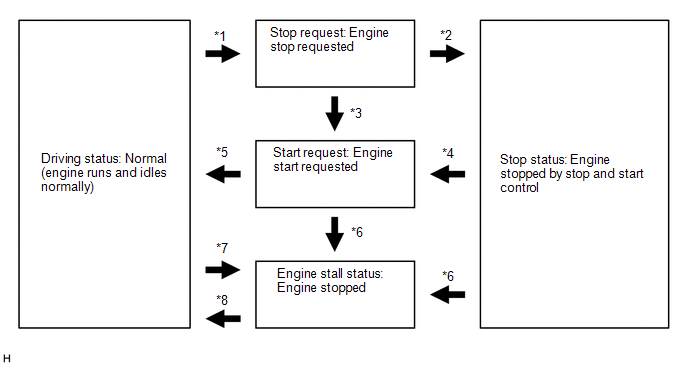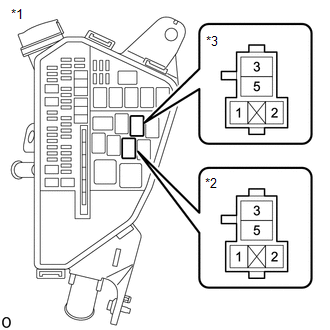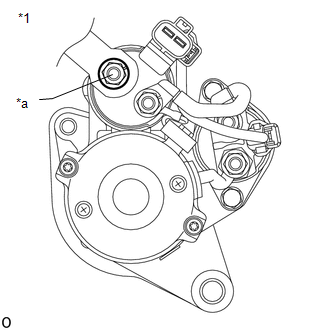| Last Modified: 01-30-2024 | 6.11:8.1.0 | Doc ID: RM100000001EEKC |
| Model Year Start: 2019 | Model: RAV4 | Prod Date Range: [11/2018 - 08/2020] |
| Title: STOP AND START: STOP AND START SYSTEM: P160300; Engine Stall History; 2019 - 2020 MY RAV4 [11/2018 - 08/2020] | ||
|
DTC |
P160300 |
Engine Stall History |
DESCRIPTION
If the engine stalls or fails to start while stop and start control is operating, DTC P160300 will be stored. Using the Techstream, the freeze frame data recorded the moment the DTC is stored can be read. Serviceability has been enhanced by enabling the cause of an engine stall or engine start failure which occurred while stop and start control was operating to be checked using the freeze frame data.
|
DTC No. |
Detection Item |
DTC Detection Condition |
Trouble Area |
Warning Indicate |
Memory |
Note |
|---|---|---|---|---|---|---|
|
P160300 |
Engine Stall History |
Both of the following conditions are met for 0.5 seconds or more (1 trip detection logic):
Both of the following conditions are met for 0.5 seconds or more (1 trip detection logic):
Both of the following conditions are met for 0.5 seconds or more (1 trip detection logic):
Both of the following conditions are met for 0.5 seconds or more (1 trip detection logic):
Both of the following conditions are met for 0.5 seconds or more (1 trip detection logic):
Detection Conditions: Always Sensors/components used for detection: engine hood courtesy switch (hood lock assembly), park/neutral position switch assembly, airbag ECU assembly, battery, crankshaft position sensor, STA signal circuit, ECM |
|
Does not come on |
DTC stored |
SAE Code: P1603 |
*1: Only when the shift lever is in D.
*2: The mode "stalled" represents a state in which engine restart is prohibited/canceled due to a collision being detected or the engine hood being opened and restart is not preferable. In this situation, "IG" is displayed for the Data List item [Stop&Start of Eng State]. If the mode changes to "IG", engine start by stop and start control is prohibited and the engine can only be started by operating the ignition switch (w/o Smart Key System) or push start switch assembly (w/ Smart Key System).
*3: Engine stop judgment is performed to judge whether the engine is stopped completely. The engine stop and start ECU judges that the engine is stopped when it does not receive an engine speed signal (NE signal) from the ECM for 0.6 seconds or more.
*4: The engine stop and start ECU stores DTC P033562.
WIRING DIAGRAM
CAUTION / NOTICE / HINT
NOTICE:
- Before replacing the engine stop and start ECU, read the number of starter operations and write it into a new engine stop and start ECU.
- After replacing the engine stop and start ECU or air conditioning amplifier assembly, reset and perform learning of the air conditioning information in the engine stop and start ECU.
- After replacing the engine stop and start ECU or airbag ECU assembly, clear and calibrate the deceleration sensor zero point in the engine stop and start ECU.
- When the engine stop and start ECU or oil pump with solenoid assembly is replaced, check the oil pump with solenoid assembly.
- After replacing the starter assembly, perform initialization of the number of starter operations stored in the engine stop and start ECU.
- When the starter assembly is replaced, "ST NO. 1 relay" and "ST NO. 2 relay" must be also replaced.
- Inspect the fuses for circuits related to this system before performing the following procedure.
HINT:
- If other DTCs are output, perform troubleshooting for this DTC first.
- Unlike other DTCs that are stored due to a malfunction in parts, circuits or systems, DTC P160300 allows determination of a malfunctioning part according to problem symptoms and freeze frame data related to a problem recognized by the customer. As this DTC may be stored due to an operation by the customer, it is not necessary to service the vehicle unless the customer recognized a problem. Clear the DTCs and return the vehicle to the customer.
- Using the Techstream, read the freeze frame data before troubleshooting. System condition information is recorded as freeze frame data the moment a DTC is stored. This information can be useful when troubleshooting.
- DTCs for the stop and start system are not cleared even if the malfunction has been repaired. After repairing the malfunction, be sure to clear the DTCs.
-
Stop and Start Control Mode Transition:

- *1: Engine stop conditions are met.
- *2: Engine stop judgment is determined.
- *3: Engine start conditions are met before the engine is judged as stopped.
- *4: Engine start conditions are met.
- *5: Engine determined to be started (engine speed reaches a specified rpm).
- *6: Collision detected or engine hood opened and mode changed to "stalled".
- *7: 0.6 seconds elapse after engine stop judgment is established.
- *8: Engine is started using the ignition switch (w/o Smart Key System) or push start switch assembly (w/ Smart Key System).
PROCEDURE
|
1. |
CHECK DTC OUTPUT (SFI SYSTEM) |
(a) Connect the Techstream to the DLC3.
(b) Turn the ignition switch to ON.
(c) Turn the Techstream on.
(d) Enter the following menus: Powertrain / Engine / Trouble Codes.
(e) Read the DTCs.
Powertrain > Engine > Trouble Codes
|
Result |
Proceed to |
|---|---|
|
SFI system DTCs are not output |
A |
|
SFI system starting malfunction circuit DTC is output and starter assembly does not operate |
|
|
SFI system starting malfunction circuit DTC is output and starter assembly operates |
B |
|
DTCs other than SFI system starting malfunction circuit DTC are output |
HINT:
- According to the display on the Techstream, check the freeze frame data item [Cranking Time] in the sets of freeze frame data.
- If the value of [Cranking Time] is approximately 3 seconds, the stop and start control system or starter system may be malfunctioning.
- If the value of [Cranking Time] is small (approximately 0.5 seconds or less: the minimum value varies depending on the model), the SFI system may be malfunctioning.
- The Data List item [Cranking Time] indicates the length of time starter operation is requested by the engine stop and start ECU. If the engine speed exceeds the specified value, the engine stop and start ECU cancels its start request.
| B |

|
|
|
2. |
CHECK FREEZE FRAME DATA |
NOTICE:
The freeze frame data is cleared when DTCs are cleared. Be sure to make a note of necessary data in advance.
HINT:
Using the time-series freeze frame data, confirm the freeze frame data recorded the moment the DTC was stored and after the DTC was stored. This information can be useful when troubleshooting.
(a) According to the prompts on the Techstream screen, read the time-series freeze frame data to confirm the vehicle conditions when an engine stall occurred while stop and start control was operating.
(b) Check the freeze frame data for engine stall history and engine start failure.
|
Techstream Display |
Result |
Proceed to |
|---|---|---|
|
Engine Stall History during Stop&Start (Hood Open) |
Yes |
A |
|
Engine Stall History during Stop&Start (Collision or Battery Voltage Low) |
Yes |
B |
|
Engine Stall History during Engine Starting (Collision) |
Yes |
|
|
Engine Start Fail |
Yes |
C |
| B |

|
| C |

|
|
|
3. |
READ VALUE USING TECHSTREAM (HOOD COURTESY SWITCH) |
NOTICE:
Before performing this step, check that the engine hood can be opened by pulling the hood lock control cable.
(a) Connect the Techstream to the DLC3.
(b) Turn the ignition switch to ON.
(c) Turn the Techstream on.
(d) Enter the following menus: Powertrain / Stop and Start / Data List / Hood Courtesy Switch.
Powertrain > Stop and Start > Data List
|
Tester Display |
|---|
|
Hood Courtesy Switch |
(e) According to the display on the Techstream, read the Data List.
OK:
|
Techstream Display |
Condition |
Normal Condition |
|---|---|---|
|
Hood Courtesy Switch |
Engine hood closed |
ON |
|
Engine hood open |
OFF |
| OK |

|
|
|
4. |
INSPECT HOOD LOCK ASSEMBLY (ENGINE HOOD COURTESY SWITCH) |
(a) Inspect the engine hood courtesy switch (hood lock assembly).
| NG |

|
|
|
5. |
CHECK HARNESS AND CONNECTOR (ENGINE HOOD COURTESY SWITCH (HOOD LOCK ASSEMBLY) - BODY GROUND) |
(a) Disconnect the engine hood courtesy switch (hood lock assembly) connector.
(b) Measure the resistance according to the value(s) in the table below.
Standard Resistance:
|
Tester Connection |
Condition |
Specified Condition |
|---|---|---|
|
A17-2 (E) - Body ground |
Always |
Below 1 Ω |
| NG |

|
REPAIR OR REPLACE HARNESS OR CONNECTOR |
|
|
6. |
CHECK HARNESS AND CONNECTOR (ENGINE STOP AND START ECU - ENGINE HOOD COURTESY SWITCH (HOOD LOCK ASSEMBLY)) |
(a) Disconnect the engine stop and start ECU connector.
(b) Disconnect the engine hood courtesy switch (hood lock assembly) connector.
(c) Measure the resistance according to the value(s) in the table below.
Standard Resistance:
|
Tester Connection |
Condition |
Specified Condition |
|---|---|---|
|
A34-7 (BNT1) - A17-1 (+) |
Always |
Below 1 Ω |
|
A34-7 (BNT1) or A17-1 (+) - Body ground and other terminals |
Always |
10 kΩ or higher |
| OK |

|
| NG |

|
REPAIR OR REPLACE HARNESS OR CONNECTOR |
|
7. |
CHECK VEHICLE CONDITION (COLLISION HISTORY) |
(a) Check if the vehicle was in a collision when the engine stalled.
|
Result |
Proceed to |
|---|---|
|
Vehicle was in collision when engine stalled |
A |
|
Vehicle was not in collision when engine stalled |
B |
HINT:
When "Engine Stall History during Stop&Start (Collision or Battery Voltage Low)" or "Engine Stall History during Engine Starting (Collision)" is stored:
This may have been stored because the vehicle was in a collision or a collision detection signal was input while stop and start control was operating.
| A |

|
END (ENGINE STALLED BECAUSE COLLISION DETECTION SIGNAL WAS RECEIVED) |
| B |

|
|
8. |
CHECK HARNESS AND CONNECTOR (ENGINE STOP AND START ECU - ST NO. 1 RELAY AND ST NO. 2 RELAY) |
(a) Disconnect the engine stop and start ECU connector.
(b) Remove the ST NO. 1 relay and ST NO. 2 relay from the No. 1 engine room relay block and No. 1 junction block assembly.
(c) Disconnect the certification ECU (smart key ECU assembly) connector. (w/ Smart Key System)
(d) Disconnect the park/neutral position switch assembly connector.
(e) Disconnect the ECM connector.
(f) Measure the resistance according to the value(s) in the table below.
Standard Resistance:
|
Tester Connection |
Condition |
Specified Condition |
|---|---|---|
|
A34-21 (STA) - 2 (ST NO. 1 relay) |
Always |
Below 1 Ω |
|
A34-23 (STA2) - 2 (ST NO. 2 relay) |
Always |
Below 1 Ω |
|
A34-21 (STA) or 2 (ST NO. 1 relay) - Body ground and other terminals |
Always |
10 kΩ or higher |
|
A34-23 (STA2) or 2 (ST NO. 2 relay) - Body ground and other terminals |
Always |
10 kΩ or higher |
| NG |

|
REPAIR OR REPLACE HARNESS OR CONNECTOR (ENGINE STOP AND START ECU - ST NO. 1 RELAY OR ST NO. 2 RELAY) |
|
|
9. |
CHECK HARNESS AND CONNECTOR (ST NO. 1 RELAY AND ST NO. 2 RELAY - BODY GROUND) |
(a) Remove the ST NO. 1 relay and ST NO. 2 relay from the No. 1 engine room relay block and No. 1 junction block assembly.
(b) Measure the resistance according to the value(s) in the table below.
Standard Resistance:
|
Tester Connection |
Condition |
Specified Condition |
|---|---|---|
|
1 (ST NO. 1 relay) - Body ground |
Always |
Below 1 Ω |
|
1 (ST NO. 2 relay) - Body ground |
Always |
Below 1 Ω |
| NG |

|
REPAIR OR REPLACE HARNESS OR CONNECTOR (ST NO. 1 RELAY OR ST NO. 2 RELAY - BODY GROUND) |
|
|
10. |
CHECK HARNESS AND CONNECTOR (ST NO. 1 RELAY AND ST NO. 2 RELAY - BATTERY) |

|
*1 |
No. 1 Engine Room Relay Block and No. 1 Junction Block Assembly |
|
*2 |
ST NO. 1 Relay |
|
*3 |
ST NO. 2 Relay |
(a) Remove the ST NO. 1 relay and ST NO. 2 relay from the No. 1 engine room relay block and No. 1 junction block assembly.
(b) Measure the voltage according to the value(s) in the table below.
Standard Voltage:
|
Tester Connection |
Condition |
Specified Condition |
|---|---|---|
|
5 (ST NO. 1 relay) - Body ground |
Always |
9.5 to 14 V |
|
5 (ST NO. 2 relay) - Body ground |
Always |
9.5 to 14 V |
| NG |

|
REPAIR OR REPLACE HARNESS OR CONNECTOR (ST NO. 1 RELAY OR ST NO. 2 RELAY - BATTERY) |
|
|
11. |
CHECK HARNESS AND CONNECTOR (STARTER ASSEMBLY - BATTERY) |

|
*1 |
Starter Assembly |
|
*a |
D1-1 (B) |
(a) Measure the voltage according to the value(s) in the table below.
Standard Voltage:
|
Tester Connection |
Condition |
Specified Condition |
|---|---|---|
|
D1-1 (B) - Body ground |
Always |
9.5 to 14 V |
NOTICE:
Before performing this step, check that the starter assembly connector D1 is not disconnected or loose.
| NG |

|
REPAIR OR REPLACE HARNESS OR CONNECTOR |
|
|
12. |
CHECK HARNESS AND CONNECTOR (ST NO. 1 RELAY AND ST NO. 2 RELAY - STARTER ASSEMBLY) |
(a) Remove the ST NO. 1 relay and ST NO. 2 relay from the engine room relay block and junction block assembly.
(b) Disconnect the starter assembly connector.
(c) Measure the resistance according to the value(s) in the table below.
Standard Resistance:
|
Tester Connection |
Condition |
Specified Condition |
|---|---|---|
|
3 (ST NO. 1 relay) - C43-2 (SL1) |
Always |
Below 1 Ω |
|
3 (ST NO. 2 relay) - C43-1 (SL2) |
Always |
Below 1 Ω |
| NG |

|
REPAIR OR REPLACE HARNESS OR CONNECTOR (ST NO. 1 RELAY OR ST NO. 2 RELAY - STARTER ASSEMBLY) |
|
|
13. |
INSPECT RELAY (ST NO. 1 RELAY AND ST NO. 2 RELAY) |
(a) Inspect the ST NO. 1 relay.
(b) Inspect the ST NO. 2 relay.
| NG |

|
REPLACE RELAY (ST NO. 1 RELAY OR ST NO. 2 RELAY) |
|
|
14. |
INSPECT STARTER ASSEMBLY |
(a) Inspect the starter assembly.
| OK |

|
| NG |

|
|
|
|
![2019 - 2023 MY RAV4 [11/2018 - 10/2023]; STOP AND START: STOP AND START SYSTEM: Engine Hood Courtesy Switch Circuit+](/t3Portal/stylegraphics/info.gif)
